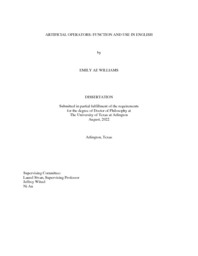
ATTENTION: The works hosted here are being migrated to a new repository that will consolidate resources, improve discoverability, and better show UTA's research impact on the global community. We will update authors as the migration progresses. Please see MavMatrix for more information.
Show simple item record
| dc.contributor.advisor | Stvan, Laurel S | |
| dc.creator | Williams, Emily AE | |
| dc.date.accessioned | 2022-09-15T14:08:39Z | |
| dc.date.available | 2022-09-15T14:08:39Z | |
| dc.date.created | 2022-08 | |
| dc.date.issued | 2022-08-12 | |
| dc.date.submitted | August 2022 | |
| dc.identifier.uri | http://hdl.handle.net/10106/30986 | |
| dc.description.abstract | This dissertation provides a descriptive account of the use of ‘artificial operators’ on Reddit. I adopt the term artificial operators to refer to written symbols (e.g., #, ™, ©, ®) with overlapping linguistic and metadiscursive properties that are leveraged for a pragmatic effect (e.g., I love her even though she’s problematic™). I employ a mixed-methods approach, using a combination of corpus, experimental, and machine learning methods. Using a 1.2 billion word diachronic corpus of comments from the popular forum website, Reddit, I demonstrate that these operators are used in a small percentage of Reddit communities. Operator usage is therefore often community-specific and provides a useful indicator of the shared repertoire that exists within online Communities of Practice (Lave and Wenger, 1991; Wenger 1998). Operators often function as stance markers, contributing to all three components of stancetaking (evaluation, positioning, alignment). Operators also interact with adjectives by upscaling, or in some cases, downscaling the adjective meaning. Input from social media users indicate that there are perceivable differences between genuine and figurative uses of the operators but do not show perceivable differences between the meaning contributed by the four distinct operators under controlled conditions. Feature importance scores from machine learning models suggest that author-related features are more important than subreddit-related features in modeling operator use. Ultimately, this dissertation shows that artificial operators are a pragmatic resource that authors use to perform a variety of functions, including stance marking, upscaling, and indicating community membership. This work contributes to broader research around pragmatics in computer-mediated communication (CMC) which has shown that authors use CMC cues and other online textual resources not as a replacement for paralinguistic cues, but as new ways to create nuanced and sophisticated meaning. | |
| dc.format.mimetype | application/pdf | |
| dc.language.iso | en_US | |
| dc.subject | Computer-mediated communication | |
| dc.subject | Stance marking | |
| dc.subject | Internet language | |
| dc.subject | Reddit | |
| dc.subject | Symbols | |
| dc.subject | Hashtags | |
| dc.subject | Trademark symbols | |
| dc.subject | Copyright symbols | |
| dc.subject | Registered trademark symbols | |
| dc.title | Artificial Operators: Function and Use in English | |
| dc.type | Thesis | |
| dc.degree.department | Linguistics | |
| dc.degree.name | Doctor of Philosophy in Linguistics | |
| dc.date.updated | 2022-09-15T14:08:39Z | |
| thesis.degree.department | Linguistics | |
| thesis.degree.grantor | The University of Texas at Arlington | |
| thesis.degree.level | Doctoral | |
| thesis.degree.name | Doctor of Philosophy in Linguistics | |
| dc.type.material | text | |
| dc.creator.orcid | 0000-0002-6283-3126 | |
Files in this item
- Name:
- WILLIAMS-DISSERTATION-2022.pdf
- Size:
- 2.218Mb
- Format:
- PDF
This item appears in the following Collection(s)
Show simple item record


